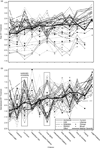Meta-analysis of DSM alcohol use disorder criteria severities: structural consistency is only 'skin deep'
- PMID: 27019218
- PMCID: PMC4894493
- DOI: 10.1017/S0033291716000404
Meta-analysis of DSM alcohol use disorder criteria severities: structural consistency is only 'skin deep'
Abstract
Background: Item response theory (IRT) analyses of alcohol use disorder (AUD) and other psychological disorders are a predominant method for assessing overall and individual criterion severity for psychiatric diagnosis. However, no investigation has established the consistency of the relative criteria severities across different samples.
Method: PubMed/Medline, PsycINFO, Web of Science and ProQuest databases were queried for entries relating to alcohol use and IRT. Study data were extracted using a standardized data entry sheet. Consistency of reported criteria severities across studies was analysed using generalizability theory to estimate generalized intraclass correlations (ICCs).
Results: A total of 451 citations were screened and 34 papers (30 unique samples) included in the research synthesis. The AUD criteria set exhibited low consistency in the ordering of criteria using both traditional [ICC = 0.16, 95% confidence interval (CI) 0.06-0.56] and generalized (ICC = 0.18, 95% CI 0.15-0.21) approaches. These results were partially accounted for by previously studied factors such as age and type of sample (e.g. clinical v. community), but the largest source of unreliability was the diagnostic instrument employed.
Conclusions: Despite the robust finding of unidimensional structure of AUDs, inconsistency in the relative severities across studies suggests low replicability, challenging the generalizability of findings from any given study. Explicit modeling of well-studied factors like age and sample type is essential and increases the generalizability of findings. Moreover, while the development of structured diagnostic interviews is considered a landmark contribution toward improving psychiatric research, variability across instruments has not been fully appreciated and is substantial.
Keywords: Alcohol use disorder; generalizability theory; item response theory; meta-analyses; severity.
Figures


Similar articles
-
Evaluating the Validity of the DSM-5 Alcohol Use Disorder Diagnostic Criteria in a Sample of Treatment-seeking Native Americans.J Addict Med. 2019 Jan/Feb;13(1):35-40. doi: 10.1097/ADM.0000000000000452. J Addict Med. 2019. PMID: 30303888 Free PMC article.
-
Reliability of Differential Item Functioning in Alcohol Use Disorder: Bayesian Meta-Analysis of Criteria Discrimination Estimates.Assessment. 2022 Jul;29(5):925-939. doi: 10.1177/1073191120986613. Epub 2021 Feb 20. Assessment. 2022. PMID: 33615848 Free PMC article.
-
Toward DSM-V: an item response theory analysis of the diagnostic process for DSM-IV alcohol abuse and dependence in adolescents.J Am Acad Child Adolesc Psychiatry. 2008 Nov;47(11):1329-39. doi: 10.1097/CHI.0b013e318184ff2e. J Am Acad Child Adolesc Psychiatry. 2008. PMID: 18827724 Free PMC article.
-
[Diagnostic structured interviews in child and adolescent's psychiatry].Encephale. 2004 Mar-Apr;30(2):122-34. doi: 10.1016/s0013-7006(04)95422-x. Encephale. 2004. PMID: 15107714 Review. French.
-
Substance use disorders: Diagnostic and Statistical Manual of Mental Disorders, fourth edition (DSM-IV) and International Classification of Diseases, tenth edition (ICD-10).Addiction. 2006 Sep;101 Suppl 1:59-75. doi: 10.1111/j.1360-0443.2006.01584.x. Addiction. 2006. PMID: 16930162 Review.
Cited by
-
Examination of the mild, moderate, and severe alcohol use disorder severity indicators using a nationally representative sample.Psychol Addict Behav. 2024 Sep;38(6):668-675. doi: 10.1037/adb0000983. Epub 2023 Dec 21. Psychol Addict Behav. 2024. PMID: 38127523 Free PMC article.
-
Impulsive dispositions and alcohol: what we know, how we know it, and where to go from here.Borderline Personal Disord Emot Dysregul. 2018 Mar 9;5:4. doi: 10.1186/s40479-018-0081-0. eCollection 2018. Borderline Personal Disord Emot Dysregul. 2018. PMID: 29556398 Free PMC article. Review.
-
Exploration of Core Symptoms for the Diagnosis of Alcohol Dependence in the ICD-10.Alcohol Clin Exp Res. 2016 Nov;40(11):2409-2417. doi: 10.1111/acer.13225. Epub 2016 Sep 26. Alcohol Clin Exp Res. 2016. PMID: 27716976 Free PMC article.
-
Not all alcohol use disorder criteria are equally severe: Toward severity grading of individual criteria in college drinkers.Psychol Addict Behav. 2019 Feb;33(1):35-49. doi: 10.1037/adb0000443. Epub 2019 Jan 24. Psychol Addict Behav. 2019. PMID: 30676037 Free PMC article.
-
Changes in DSM criteria following a culturally-adapted computerized CBT for Spanish-speaking individuals with substance use disorders.J Subst Abuse Treat. 2020 Mar;110:42-48. doi: 10.1016/j.jsat.2019.12.006. Epub 2019 Dec 13. J Subst Abuse Treat. 2020. PMID: 31952627 Free PMC article. Clinical Trial.
References
-
- American Psychiatric Association. Diagnostic and Statistical Manual of Mental Disorders. 3rd. Washington, DC: American Psychiatric Association; 1980.
-
- American Psychiatric Association. Diagnostic and Statistical Manual of Mental Disorders. 3rd edn., revised. Washington, DC: American Psychiatric Association; 1987.
-
- American Psychiatric Association. Diagnostic and Statistical Manual of Mental Disorders. 4th edn., text revision. Washington, DC: American Psychiatric Association; 2000.
-
- American Psychiatric Association. Diagnostic and Statistical Manual of Mental Disorders. 5th. Washington, DC: American Psychiatric Association; 2013.
Publication types
MeSH terms
Grants and funding
LinkOut - more resources
Full Text Sources
Other Literature Sources
Medical

